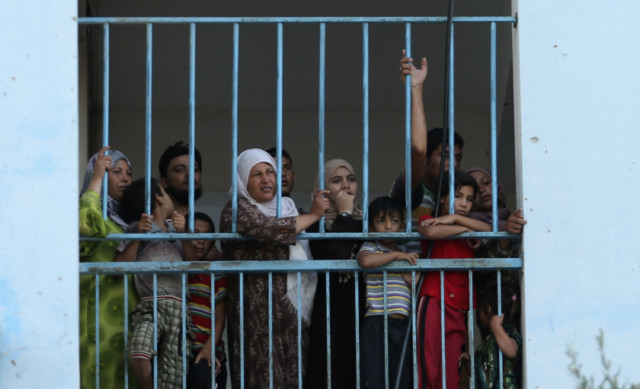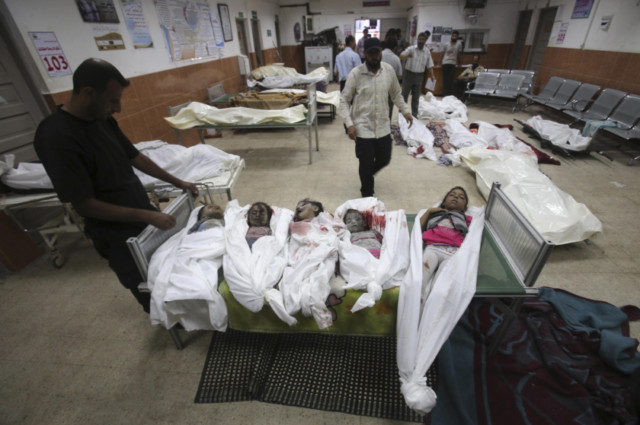
Jabaliya, Gaza Strip: The Balata family living in Gaza has to make tough decisions on how to best protect their large family, extending over several generations, in one of the most war-torn enclaves in Gaza. Eleven members of the family were killed in a single strike Tuesday, their bodies now buried in two fresh graves on a sandy hilltop cemetery near their homes. The corpses — one man, eight women, a boy and a baby - were shrouded in white, per Muslim custom.
As the conflict rages, displacing hundreds of thousands, UN and Palestinian officials say some families have made a macabre calculation: to split up, with each group seeking refuge in different parts of Gaza. If one part of the family gets killed, others will live on to help the survivors and keep their dynasty alive.
But most families, officials say, still move together as a source of strength and comfort. Some are now living with other relatives, further increasing their familial size, while others have taken shelter in UN-run schools and other refuges. The war, though, has increasingly tracked them down in their havens.
“Unfortunately, many families have lost whole portions of their family,” said Adnan Abu Hasna, a spokesman for the UN Relief and Works Agency, which is assisting some 200,000 Palestinians in its 85 schools. “The families gather together as a kind of protection, psychological mostly. . . . It’s a cultural thing. They say, ‘If we die, we die together as a family.’ “
The Balatas, too, opted to stick together.
Three days ago, Naim Balata, 45, an electrician, arrived at his elder brother’s house with his wife, six daughters and 7-year-old son, Yahya. They had been warned by the Israeli military to leave their section of Jabaliya. After lunch Tuesday, Naim took a nap, as did his brother, Abdul Karim. The women cleaned up and chatted, reconnecting. That is when the first hit occurred, an explosion that tore through the house, sending bricks, metal and dust flying, recalled Abdul Karim who had woken up and ran outside, along with his son and wife.
Then a second one came, throwing Abdul Karim to the ground. When he got up, he ran back into his house to help his relatives.
“I found my nephew, Yahya, on the ground and picked him up,” Abdul Karim said. “Half his face was ripped apart.”
Nearby lay his grandson and namesake. He was 14 months old. His hand was nearly severed, and he was covered in blood but still alive. When he saw him, Abdul Karim lost consciousness. An ambulance arrived and took the infant to the hospital.
Family members later found the bodies of Naim, his wife and his six daughters in the rubble. They were all in his bedroom, as if they had gone there to wake him up after the first explosion. The body of Abdul Karim’s 18-year-old daughter, Hadeel, was also in the debris.
By nightfall, the Balata family had buried their dead in the cemetery, steps away from the house. On Wednesday morning, the baby died of his injuries in the hospital. He was later placed in one of the graves.
At a memorial service Wednesday afternoon, Alaa Balata sat solemnly in a chair. The son of Naim, he was also in the house but escaped. Now, he was the last surviving member of his family, the only one who will carry on his father’s name. Alaa showed a photo in his cellphone of his brother Yahya proudly clutching a certificate for scoring high marks on his final exams.
Moments later, he clutched a passport-size photo of his daughter, Hadeel. She, too, had scored excellent marks on her exams. She wanted to become a doctor and join the United Nations, said her father, his voice trailing off, representing the hopes of upward mobility for every Balata.
“They have destroyed my family’s future,” Abdul Karim said.













